Related Research Articles

A conscientious objector is an "individual who has claimed the right to refuse to perform military service" on the grounds of freedom of thought, conscience, or religion.
Refusal to serve in the IDF is when citizens of Israel refuse to serve in the Israel Defense Forces or disobey orders on the grounds of pacifism, antimilitarism, religious philosophy, or political disagreement with Israeli policy such as the occupation of the Palestinian territories. Conscientious objectors in Israel are known as sarvanim which is sometimes translated as "refuseniks", or mishtamtim.

Operation Linebacker II was an aerial bombing campaign conducted by U.S. Seventh Air Force and U.S. Navy Task Force 77 against targets in the Democratic Republic of Vietnam during the final period of U.S. involvement in the Vietnam War. The operation was conducted from 18 to 29 December 1972, leading to several informal names such as "The December Raids" and "The Christmas Bombings". In Vietnam, it is just simply called "12 days and nights" and "Operation Dien Bien Phu in the air" or just simply Dien Bien Phu in the air. Unlike the Operation Rolling Thunder and Operation Linebacker interdiction operations, Linebacker II was designed to be a "maximum effort" bombing campaign to "destroy major target complexes in the Hanoi and Haiphong areas, which could only be accomplished by B-52s". It saw the largest heavy bomber strikes launched by the U.S. Air Force since World War II.

During Operation Arc Light from 1965 to 1973, the United States Air Force deployed B-52F Stratofortresses from bases in the U.S. Territory of Guam to provide battlefield air interdiction during the Vietnam War. This included strikes at enemy bases, supply routes, and behind the lines troop concentrations, as well as occasionally providing close air support directly to ground combat operations in Vietnam.
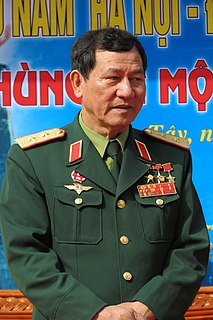
Phạm Tuân is a retired Vietnam Air Force aviator and cosmonaut. He became the first Vietnamese citizen and the first person from an Asian country to fly in space when he launched aboard the Soyuz 37 mission as an Interkosmos Research Cosmonaut. He was awarded the title Hero of the Soviet Union.

Major General Salvador Enrique Felices was the first Puerto Rican to reach the rank of major general in the United States Air Force. In 1957, he participated in "Operation Power Flite", the first round-the-world nonstop flight by a jet airplane.
Carswell Air Force Base is a former United States Air Force (USAF) base, located northwest of Fort Worth, Texas. For most of its operational lifetime, the base's mission was to train and support heavy strategic bombing groups and wings.

James Robinson "Robbie" Risner was a Brigadier General, fighter pilot in the United States Air Force, and a senior leader among U.S. prisoners of war during the Vietnam War.

Ehren Keoni Watada is a former first lieutenant of the United States Army, best known as the first commissioned officer in the US armed forces to refuse to deploy to Iraq. In June 2006, Watada refused to deploy for his unit's assigned rotation to Operation Iraqi Freedom, saying he believed the war to be illegal and that, under the doctrine of command responsibility, it would make him party to war crimes. At the time, he was assigned to duty with the 5th Battalion, 20th Infantry Regiment, part of the 3rd Brigade, 2nd Infantry Division, as a fire support officer. He was brought before a court-martial in 2007 which ended in a mistrial; the Army subsequently discharged him under "Other-Than-Honorable-Conditions" (OTH) in 2009. An OTH discharge is the least favorable type of administrative discharge from the Army, and is reserved for a "pattern of behavior that constitutes a significant departure from the conduct expected of Soldiers of the Army."
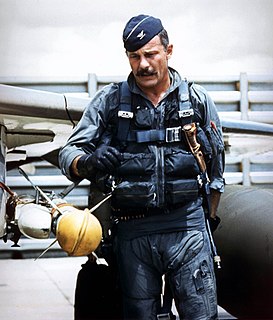
Robin Olds was an American fighter pilot and general officer in the United States Air Force. He was a "triple ace", with a combined total of 17 victories in World War II and the Vietnam War. He retired in 1973 as a brigadier general, after 30 years of service.
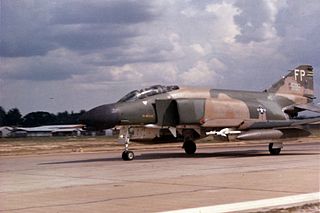
Operation Bolo was a United States Air Force mission during the Vietnam War, considered to be a successful combat ruse.
Dale Edwin Noyd was a decorated captain and fighter pilot in the U.S. Air Force who gained worldwide attention when he became a conscientious objector to protest the Vietnam War.
The United States Air Force became a separate military service on 18 September 1947 with the implementation of the National Security Act of 1947. The Act created the National Military Establishment, later renamed the United States Department of Defense, which was composed of four of the five branches, the Army, Marine Corps, Navy, and a newly created Air Force. Prior to 1947, the responsibility for military aviation was divided between the Army for land-based operations and the Navy and Marine Corps for sea-based operations from aircraft carrier and amphibious aircraft. The Army created the first antecedent of the Air Force on 1 August 1907, which through a succession of changes of organization, titles, and missions advanced toward eventual separation 40 years later. The predecessor organizations leading up to today's U.S. Air Force are:

John Daniel Lavelle was a United States Air Force general and commander of Seventh Air Force, with headquarters at Tan Son Nhut Air Base, Republic of Vietnam. Lavelle was removed from his position in 1972 and forced to retire due to alleged misconduct over bombing missions during the Vietnam War while serving as the Seventh Air Force commander. Since the ranks of general and lieutenant general are temporary ranks and linked to their corresponding position of assignment, federal law at the time, required senatorial approval for an officer to retire at these higher ranks. Due to these allegations the Senate refused to confirm Lavelle's retirement as a four-star or three-star general. Lavelle was reverted and retired at his permanent two-star rank of major general.
Field punishment is any form of punishment used against military personnel in the field; that is, field punishment does not require that the member be incarcerated in a military prison or reassigned to a punishment battalion. It may be formalised under a system of military justice and may be a sentence imposed in a court martial or similar proceedings

William Joseph Crumm, was a United States Air Force major general who was killed in July 1967, during the Vietnam War. General Crumm commanded the 3d Air Division from 1965 until his death in a B-52 mid-air collision with another B-52 bomber over the South China Sea. General Crumm was the first American general officer and the first of two Air Force general officers (pilots) who were killed during the Vietnam War.
Combat Skyspot was the ground-directed bombing (GDB) operation of the Vietnam War by the United States Air Force using Bomb Directing Centrals and by the United States Marine Corps using Course Directing Centrals. Combat Skyspot's command guidance of B-52s and tactical fighters and bombers—"chiefly flown by F-100's"—at night and poor weather was used for aerial bombing of strategic, close air support, interdiction, and other targets. Using a combination radar/computer/communications system at operating location in Southeast Asia, a typical bombing mission had an air command post turn over control of the mission to the radar station, and the station provided bomb run corrections and designated when to release bombs.
Conscientious objection in the United States is based on the Military Selective Service Act, which delegates its implementation to the Selective Service System. Conscientious objection is also recognized by the Department of Defense.
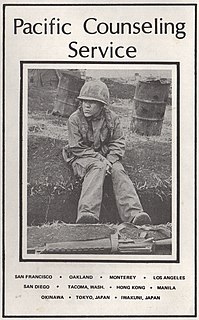
The Pacific Counseling Service (PCS) was a GI counseling service organization created by antiwar activists during the Vietnam War. PCS saw itself as trying to make the U.S. Armed Forces "adhere more closely to regulations concerning conscientious objector discharges and G.I. rights." The Armed Forces Journal, on the other hand, said PCS was involved in "antimilitary activities", including "legal help and incitement to dissident GIs." PCS evolved out of a small GI Help office started by a freshly discharged Air Force Sergeant in San Francisco, California in January 1969. The idea rapidly caught on among antiwar forces and within a year PCS had offices in Monterey, Oakland and San Diego in California, plus Tacoma, Washington. By 1971 it had spread around the Pacific with additional offices in Los Angeles, Hong Kong, Okinawa, the Philippines, as well as Tokyo and Iwakuni in Japan. Each location was established near a major U.S. military base. At its peak, PCS was counseling hundreds of disgruntled soldiers a week, helping many with legal advice, conscientious objector discharges and more. As the war wound down, ending in 1975, the offices closed with the remaining office in San Francisco printing its last underground newspaper in 1976.
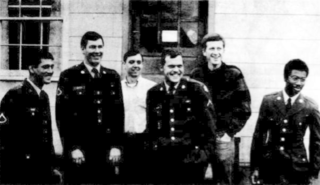
The Fort Lewis Six were six U.S. Army enlisted men at the Fort Lewis Army base in the Seattle and Tacoma, Washington area who in June 1970 refused orders to the Vietnam War and were then courts-martialed. They had all applied for conscientious objector status and been turned down by the Pentagon. The Army then ordered them to report for assignment to Vietnam, which they all refused. The Army responded by charging them with "willful disobedience" which carried a maximum penalty of five years at hard labor. The six soldiers were Private First Class Manuel Perez, a Cuban refugee; Private First Class Paul A. Forest, a British citizen from Liverpool; Specialist 4 Carl M. Dix Jr. from Baltimore; Private James B. Allen from Goldsboro, North Carolina; Private First Class Lawrence Galgano from Brooklyn, New York; and Private First Class Jeffrey C. Griffith from Vaughn, Washington. According to the local GI underground newspaper at Fort Lewis, this was the largest mass refusal of direct orders to Vietnam at the base up to that point in the war. Their refusal and subsequent treatment by the Army received national press coverage.
References
- 1 2 3 4 5 "Bombing Fallout". TIME. January 22, 1973. Archived from the original on March 30, 2007.
- 1 2 3 Sibley, John (17 February 1973). "Ex-pilot of B-52 Firm on Decision". The New York Times . p. 19.
- 1 2 "One Man's Answer". The New York Times. 14 January 1973. p. 220.
- ↑ "ABC Evening News for Thursday, Jan 11, 1973: Vietnam/Heck". Television News Archive. Vanderbilt University.
- ↑ Ripley, Anthony. "Pilot Who Balked Gets A Discharge." New York Times 09 Feb 1973: 73.